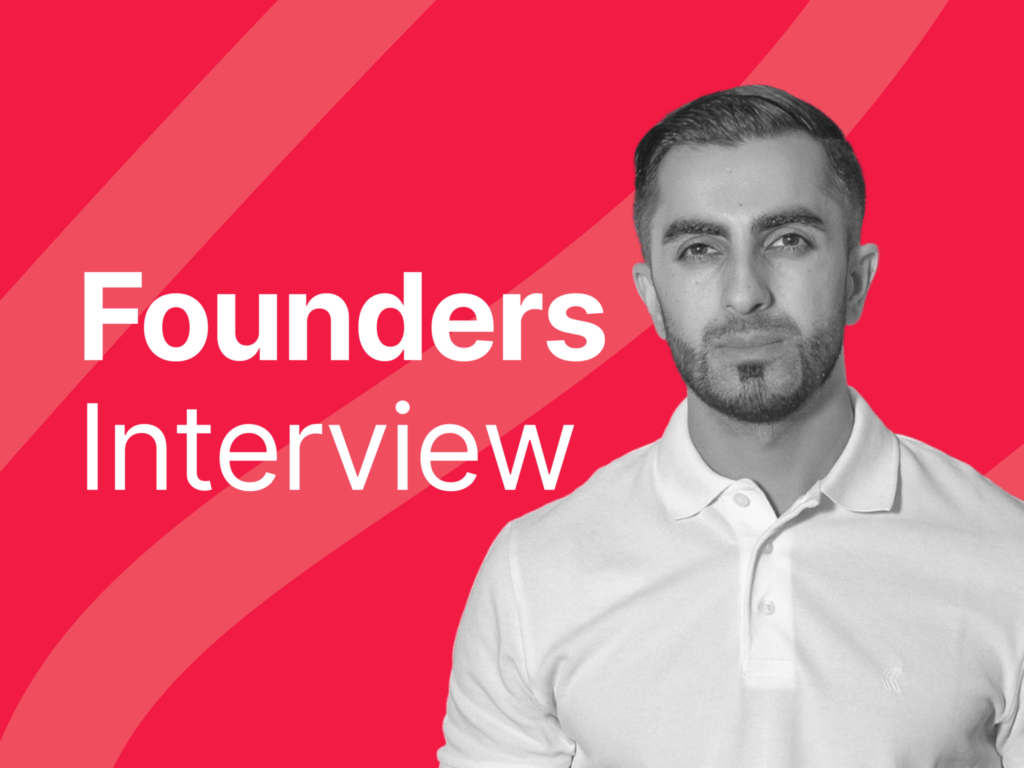A little bit about Namik:
[/vc_column_text][vc_separator color=”black”][vc_column_text]This interview has been edited for brevity and clarity.
Trackmind: Thank you so much for joining me today. Can I know how to pronounce your name?
Namik: Namik.
Trackmind: Namik, can you give me a little bit of background about yourself? Where you’re from, what you do.
Namik: Sure. Originally, I was born in Russia from Azeri family, my parents from Azerbaijan. And then I moved to the United States, it was 15 years ago. I went to college. I studied finance and investment. Tried to work in finance, but I didn’t really feel like it was my thing. I was kind of an entrepreneur from a very, very young age and that’s where I felt like I wanted to do some impact and create a product. I tried a few other businesses before starting GNGR that weren’t really successful like GNGR. Yeah, so I learned a lot of things along the way and I was trying to go back into finance again. And then I’m like, “No, this is definitely not what I want to do.” And then I went back into CPG and now we are selling ginger shots.
Trackmind: That’s really cool. Can you tell me a little bit about your product, your brand, your company? How did you come up with the idea and what’s the story behind it?
Namik: Sure. Sounds good. So the original idea for the product itself came from my mom’s recipe. It’s a ginger, lemon, honey paste that I use as a natural remedy against cold and sore throat. And I think that probably every person has that pretty much similar story. And then it was 2019 when I started to experiment with some of the ingredients and I started making those ginger turmeric shots for myself, just drinking them. And, originally, it wasn’t ideal for the business. It was more something for myself. And I was working outside in New York, so I would take this ginger shot in the morning and I would go to work. And I felt like it warms me up and gives me some energy.
And then I would just start sharing this with some friends and someone would come over and, “Take this ginger shot.” They’re like, “Oh, what is this?” And, eventually, it just kind of happened that people started asking me to make more of this product. And then another thing happened, I bought a juicer machine to juice the ginger, but ginger root it’s very hard. And one time my juicer just blew up into a thousand pieces and all this ginger was all over my apartment. And that’s when I realized that probably a lot of other people have the same issues. And I kind of start digging around, just trying to understand the whole concept of the ginger shot. And I just realized that it’s kind of like an excellent remedy against cold and flu and we are always going to have a flu season, forever, essentially.
And then in summer 2019, I shared with my business partner, I also gave him a ginger shot. He also liked the product. He was like, “Oh, this is kind of cool.” So we just started to just really look into this as a business idea. And then, obviously, we were about to launch and COVID happened. And, obviously, it probably was the best product you can launch during the COVID because everyone needed immunity and that just, it all happened. We just grew so fast. We started distributing in New York with a group of friends with trucks driving all over Manhattan and Brooklyn. And then, six months later, we got picked up by a regional distributor. It’s with Dora’s Naturals, we’ve been with them a little over the year now. Now our products are sold across 800 accounts. It goes in ShopRite, Walgreens, Duane Reade, and some other chains as well. So that’s kind of like a brief story.
Trackmind: Well, that’s nice. Yeah. No, that’s really good. So the recipe that you have, is that something that you were making at home, like your mom’s recipe? Or did you tweak it a little bit over time?
Namik: Right, so the original recipe was just ginger, lemon, and honey. It’s like I would make these little jars that would stay in my fridge for a few months. But then when I started experimenting with a formula and consulting with my mom, she’s like, “Oh, you need to add turmeric. You need to add cinnamon,” and all that stuff. So I kind of started experimenting and then I just, after a bunch of experiments, this was a ginger, turmeric, orange, pineapple juice, whatever, cayenne pepper, just always the perfect formula that I felt it just… A right formula. And that was our actual SKU that we launched. And we never changed the formula. We never tweaked the original formula, the original SKU. And then we start adding all the flavors, all the SKUs that we are kind of mixing and experimenting.
Trackmind: Well, that’s nice. And, when you started, you had the idea, you’re packaging it and everything. What was the biggest challenge that you had?
Namik: I think the biggest challenge was when we launched during the pandemic, everything was closed and you couldn’t really get any distributor because everything was shut down, everything was on hold. And I think that was kind of the biggest challenge for us. And my business partner, he said, “Well, maybe we should just self-distribute this product.” And, at the time, I also was working with a distributor and I know how hard it is to do self distribution, especially in New York. And we’re like, “I’m not sure if it’s going to work.” And we just decided to do it. And actually it worked. And it worked even better because, at the time, also, during the pandemic, there were no other brands who were launching and we pretty much were the only brand that launched in New York at the time and we just kind of grew very fast.
Trackmind: Yeah. Well, that’s nice. Okay, you started this business actually, and now as you are going into it, what are three things that you wish you knew before you got into this?
Namik: That’s an interesting question. I think like so many things I wanted to know. I think that just kind of negotiating with everyone, especially negotiating with the cold packers, negotiating with the distributors, negotiating over the chains, and kind of knowing about slotting fee and actually knowing how much money you really need to start the business, especially a beverage business, because it’s extremely, you need a lot of cash to keep going and bringing your product on the market. But, honestly, I think that the way we did, we made a couple of mistakes here and there, but I think, overall, I guess it’s just you learn things as you’re doing things and you make mistakes. And so not really anything specific that I wish I knew because like I said, I had some businesses before this also in the CPG so I kind of learned a lot during that time.
Trackmind: That’s good. And what has been the biggest success you’ve had?
Namik: Well, I think one of the biggest successes is just getting into Walgreens and Duane Reade. When we started our business, I had two main kinds of chains where I wanted to sell our product. It was Target and also Walgreens. So we got into Walgreens. It’s kind of our product, it has that pharmaceutical look and I thought this would be cool to sell at the actual pharmacy. And so I think that was kind of my proudest moment because that was my target store and we got there.
Trackmind: That’s nice. And okay, so in terms of marketing, what was your expectation before you launched the product, in the sense that, okay, I’m going to have, I guess, so much money set aside for marketing? Or did you have any marketing plan knowing that the beverage industry is a competitive space and it’s niche and there’s a lot of brands out there that are more or less doing the same thing as you?
Namik: Right. So I think our biggest differentiation from all the other brands, if you look throughout the whole landscape of shot businesses or cold pressed juices, the way they kind of position themselves, they are associated with Earth and fields and farms and like yoga moms and all that stuff. And I felt like that concept has been so overused and I thought that the only way for us to stand out from all other brands is just to create a unique pharmaceutical packaging that’s going to put us apart from all our competition. And our product, it’s also 100% organic. We don’t use any kind of preservatives. And I think taste wise, our product is one of the best tasting, as well. But, at the same time I wanted to create something, our product, it’s kind of a little medicine. So I felt like we want to create a design that’s going to reflect that idea, that it’s a little portion but it’s still organic and cold pressed and we don’t use any kind of chemicals. And it worked.
Trackmind: It did, yes. Because that message definitely came across. When Sid sent that email, I was like, “Okay, let’s check this out. Who is this?” And that message definitely came across that it’s a medicine but an organic medicine and that helps. So it felt good when I was going through your website and seeing the branding. My next question is, so you have three products right now. I was taking a look at your website, there are three products on there. Do you plan on expanding the line?
Namik: Yes. Actually, today we are releasing our fourth SKU. It’s a vitamin C that I think we’ve been working on for almost like five months, for the past five months. And it’s finally here. It’s actually available on Amazon. And it’s funny, we only got our first order on Amazon today. But we kind of experimented with a few other products. We did launch a couple of beverages on the market.
And one thing I learned about the beverage industry, just in general, when you have a brand and you have a product line, and then when you launch another product line, not the extension but a completely new product line you’re essentially starting a new business. Because it’s starting from the scratch and your branding might translate into some sales, but still, you’re starting from the scratch. So I think what we learned from our experiences is that when you have a product and you have a product that works just like you really need to concentrate on your core line that sells, that you get orders from it and just kind of try to expand that.
I think any entrepreneur will always have this urge, we want to create something new, we want to expand our product portfolio, we want to introduce new products. And I think I also have the same mentality, but one thing I learned, you really need to have a product that’s working and just try to scale that product. And then when you scale that product, obviously, your course might go down with the economy of scales. And also from a marketing perspective, when you ultra focus on one product, then it’s easier to market because when you have a shot, you have beverages, you have bars, and all kinds of stuff. So now you have to spend money on every product and market them separately, essentially.
Trackmind: Yeah. And with the vitamin C shot, did you take a look at any trends that are happening this year or happened last year that made you decide that a vitamin C shot should be the next product?
Namik: Right, so I think I looked at the few things that I think that first of all, everyone knows what’s vitamin C, right? It’s a very famous product. And as we are continuing to build our brand as a kind of pharmaceutical, let’s say pharmaceutical company, we want to add those kinds of vitamins in our portfolio. And if you go to a pharmacy, you buy things like vitamin C, vitamin D. Although we do have other SKUs that have vitamin D and zinc, but it’s not really on the label. So we want to create this expansion of our shots with vitamin C.
Trackmind: Yeah. That’s nice. So would your product be like a crossover between a beverage and a supplement?
Namik: Essentially, that’s our goal. Our motto of our company, it’s a modern approach to ancient remedies. So essentially we take ancient remedies and we repackage them. And this is kind of a convenient format to consumers. And, as I research throughout the whole industry and there are more and more people trying to use more organic ingredients or supplement, instead of, let’s say, buying NyQuil when you have a minor cold symptoms or you have sore throat or something, you would rather use ginger tea than artificial drugs or something like that. So that’s kind of our idea to build our brand with the pharmaceutical concept. But like all organic, no chemicals and stuff like that.
Trackmind: Where do you see your company going in the future?
Namik: So, right now, we are only in a three state area, in about 800 stores. So, obviously, our vision is to go and sell our product nationwide. We are in discussion with multiple bigger chains and other distributors in different other states. But, like I said, this beverage industry, it’s very difficult and I think that you need to be ready before you move anywhere or anything. And I think that’s one of the biggest problems with the beverage brands. They want to expand so fast but then they don’t have enough capital to support the expansion and then they don’t really perform in other states. But our goal, obviously, we want to sell our product nationwide and we really want to build this product within the drug channels like pharmacies and Walgreens and CVS. And I think that’s our main goal. But, also, we want to be in the natural channels like Whole Foods and Publix and other chains too.
Trackmind: Of course, yeah. That’s nice. Well, all the best for that. I hope it happens quickly. And my last question would be, based on your experience, yours and your partner’s experience, what advice would you give to founders who are trying to get into the business, start their own brand? What would be your top advice for them?
Namik: I think the top advice, and I just learned it from my own experience, like I said, I launched two consumer packaged goods before and the biggest mistake I think any early CPG founder makes, they start to invest so much in the product. What I mean is, they buy equipment, packaging equipment. They spend a lot of money on the packaging. They do all this kind of stuff but I think the first thing you need to do, you need to test your product on the market. For example, the great thing about New York, you can go to different types of stores and ask them, “I have this new product. Would you like to try it?” Maybe you can give it to them. I think the best thing you do is rent a commercial kitchen, you make some samples and put this product in a few places and just really see if this product’s selling or not. And what happens, oftentimes, when, like I said, early founders, they invest so much on the packaging and product and this and that, but the product’s not really moving. And you just lose a lot of money.
So I think you really need to test your product on the market and just you need to be honest with yourself. We all love our brands and we love our product, but you really need to be honest with yourself. You put this product in 10 stores and see if there is movement. Just spend a couple of months, three months on the market and see. And then, once you see your product is moving, then you can invest in packaging, you can invest in your social media. So I think this is the biggest advice for anyone who wants to start in consumer packaged goods.
Trackmind: Well, that is amazing. That is amazing advice. I will also keep that in mind if I ever want to start my own beverage brand. But actually, sorry, I just thought of one more question while you were speaking. So when you were starting out, were there any platforms that you went to for reference on or to get information on how to get started? What should be your first action plan?
Namik: So I think there’s a lot of, especially New York, there’s a lot of resources. When I started my first company in 2012, I was in college at the time. So we did have a program at the college that you can network with people. But then also SBA, Small Business Development Center, they also offer a lot of courses and meetup groups where you can basically learn how to start a business. And also I was attending, there was a program at Columbia University, was a free program that you can essentially go and learn about business. And I think that those events really helped me a lot because, like I said, when I was first starting out the business, I had no idea. I was like, “Okay, I have this idea, I want to make these snacks and then I know I need to buy the packaging,” but I didn’t even really know what I needed to do. So I think those kinds of things, and you can just Google and you can always find some sort of free programs. I think networking events are also great because you can talk to some other founders and you can learn from them as well.
Trackmind: Yeah. Awesome. Well, thank you so much. All of this information was absolutely amazing. And I’m super excited to share this interview with people we know, our platforms, and all our platforms. So thank you so much for joining me.
Namik: Thank you, thank you.
Enjoying our Feature Series so far? Check out other interviews and follow us on Instagram and LinkedIn to stay connected and see more stories of incredible business leaders like Namik Soltan.



